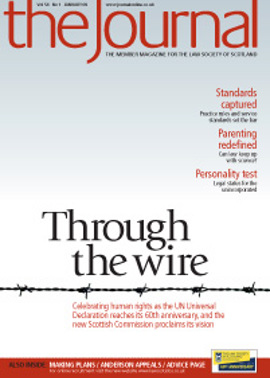Making up lost time?

Procedure rules amended
The Act of Sederunt (Sheriff Court Rules) (Miscellaneous Amendments) (No 2) 2008 came into force on 1 December 2008. In terms of OCR, rule 31.2A, an appeal in respect of a decision regarding interim diligence can be taken without leave within 14 days of the decision. OCR, rule 29.14(4) is deleted, thus removing the automatic penalty of expenses should a notice of non-admission not be intimated timeously. SCR, rule 34.2(6) makes provision for intimation of specifications of documents contained within a summary cause summons for damages for personal injuries.
Diligence on the dependence
In MRK 1 Ltd v Sara Properties [2008] CSOH 176, Lord Pentland was moved to recall warrant to arrest and inhibit on the dependence. Whilst the facts are particular to the case, his Lordship confirmed that in considering whether there existed a prima facie case in a defended action, the onus lay on the party doing diligence to establish that there was such a case. If there appeared to be an apparently substantial defence, it was difficult to say that there was a good arguable case to support the use of such diligence. The parties’ averments required to be considered along with the parties’ submissions. As warrant to execute judicial security involved interference with another’s right in property, a colourable case was insufficient. In considering issues of insolvency, the court was required to look at the prospects of the defenders satisfying any claim at the conclusion of the litigation. Accordingly, a party’s present and future financial position required to be considered. Lord Pentland considered that the pursuers satisfied these tests and that it was reasonable for the diligence to remain in place.
Decree by default
In Brown v Stewart [2008] CSOH 155, after the defender’s agents withdrew, Lord Brodie granted decree by default. The action had been ongoing for about a year, legal aid had been refused twice, and no defence had been put on record despite ample time so to do. These are simply the sort of factors that may carry weight in moving such a motion.
Joint minutes of admissions
In Russell v Jenkins, Glasgow Sheriff Court, 11 November 2008, Sheriff Mitchell referred to Macphail’s Sheriff Court Practice to confirm that a joint minute of admissions is a form of judicial admission conclusive for the purpose of that litigation. The parties have contracted to agree that certain facts are true. Accordingly, if the evidence of a party, albeit credible and reliable, is at variance to the terms of such a document, such evidence has to be ignored in light of the terms of the joint minute.
Caution for expenses
In Ewing v Times Newspapers Ltd [2008] CSOH 169, Lord Brodie ordered the pursuer to find caution. His Lordship emphasised that mere impecuniosity was insufficient to justify the ordering of caution. Consideration of the pursuer’s case suggested that whilst he had might have a statable case in certain limited aspects, it was not one with serious merits. Having considered that the pursuer might have a statable case, if caution was to be ordered there had to exist exceptional circumstances. Such circumstances existed. There was no real interest which the pursuer required to protect. The value of any claim was minimal. The pursuer had failed to pay expenses in another litigation. If the defenders considered settling the litigation solely on an economic basis, that in many respects encouraged an abuse of process. Further, article 6 of the European Convention did not give an absolute right of access to a litigant. A device whereby parties were protected from unrecoverable expense in resisting doubtful claims, and the unreasonable conduct of litigation was controlled, was Convention-friendly.
Conduct of litigation
In Moore v The Scottish Daily Record [2008] CSIH 66, the Inner House again looked at the issue of late resolution and the effects on judicial resources. In giving the lead decision of the division, the Lord Justice Clerk, Lord Gill, concluded that the order made in Billig v Council of the Law Society of Scotland (No 2) 2008 SC 150, whereby the party responsible for the late resolution of litigation could be ordered to pay court fees, was ultra vires. His Lordship considered that an appropriate penalty would be the award of expenses on an agent-client, client paying basis against the responsible party. Lord Gill then emphasised the problems caused by late settlements on court resources. That said, he observed that there was a quid pro quo. The late settlement of litigations might mean that no other alternative business could be accommodated, but it allowed judges time to deal with chamber work such as judgements and reports. In short, if court days were not lost by late settlements, specific days would require to be allocated for such chamber work. His Lordship observed that this might place greater strains on the system.
I don’t think anyone involved in the justice system will be surprised by the Lord Justice Clerk’s observations. I also do not expect to experience a wave of sympathy if I pose these two questions. Should the justice system really allocate time which undoubtedly is required for chamber work on such an ad hoc basis in the 21st century? Further, if a judge knows that the discharge of a proof or adjournment of a trial means that free time will appear for written work, might there even be the slightest possibility that less inquiry will be made into the reasons for such a motion, and accordingly justice is ultimately delayed? As Bluebottle said in The Goons, “Just a thought!”
Appealing after extract
In Black v Black 2008 GWD 38-364 the issue of appealing against an interlocutor which had been extracted arose again. The defender maintained that she had written a letter of objection to the pursuer’s simplified divorce application on the basis that she sought financial provision and suffered mental health problems. Whilst a copy of that letter was produced, the principal did not reach the sheriff clerk. Decree of divorce was granted and extracted. The defender in the appeal moved Sheriff Principal Bowen to vary the decree by making an order whereby the issue of financial provision could be resolved within a period of the decree of divorce. Sheriff Principal Bowen considered such an order could not be made in the context of a simplified divorce action. There had not been any bad faith on the part of the pursuer. Any question of whether the defender suffered a mental disorder was one for any action of reduction. The appeal was refused.
Defences to evictions
In Glasgow Housing Association Ltd v Fisher, Glasgow Sheriff Court, 30 September 2008 decree was granted at the first calling of a summary cause for recovery of heritable property. At that hearing a defence had been stated to the effect that it was unreasonable to evict the defender, with no further information provided. The ground of recovery was a criminal conviction. The sheriff granted decree as the factual basis of the action and defences was readily ascertainable. Sheriff Principal Taylor considered that the sheriff was entitled to grant decree on the basis of the information before him. He recalled the decree however on the basis of the further information submitted at the appeal hearing. It is accordingly important that a party is fully briefed for the first calling in such actions.
Expenses: competent to modify?
Really for the information of any reader not au fait with certain aspects of expenses, rather than disclosing anything earth shattering, in Campbell v Chief Constable, Northern Constabulary, Dingwall Sheriff Court, 3 December 2008, the pursuer sought to recall findings of expenses made previously by the court, which failing to modify them. The basis of the motion was that the defenders had allegedly agreed to no longer insist on the awards. This was disputed. The first motion was refused on the basis that this sought to reverse a prior interlocutor. There were other competent methods of enforcing such an agreement. The alternative motion was equally ill founded. A sheriff could modify an award of expenses at the time an award was made, either to a fixed sum if little expenditure had been incurred or as a means of marking the court’s dissatisfaction as to the successful party’s conduct of the litigation or in the matter which gave rise to the action. Once an unmodified award of expenses was made, there was no right subsequently to vary the finding by inviting the court to modify such an award.
The usual caveat applies.
In this issue
- Public law in Scotland
- Harmony in conflict management
- Tapping Reeve and his legacy
- Busy times at 60
- Living wills - why?
- Forward by the rights
- A cornerstone of rights
- Welcome for rejections takeup
- Sins of omission
- A time to buy?
- Parenthood reborn
- Persons unknown
- Front of the class
- Setting the standards
- Client service: the standards
- Judicial appointments: how you can take part
- ABS - the next phase
- Third parties and premature complaints
- Planning to perform
- Manual for the mind
- Computing on tap - or money down the drain?
- When resolution is not enough
- Ask Ash
- Making up lost time?
- Don't get caught short by transfer traps
- Collaboration: a new dimension
- Packed and ready
- Regulator on a roll
- Scottish Solicitors' Discipline Tribunal
- Website review
- Book reviews
- Medicines: the wrong cure
- Fraud alert! (and a cautionary tale)






